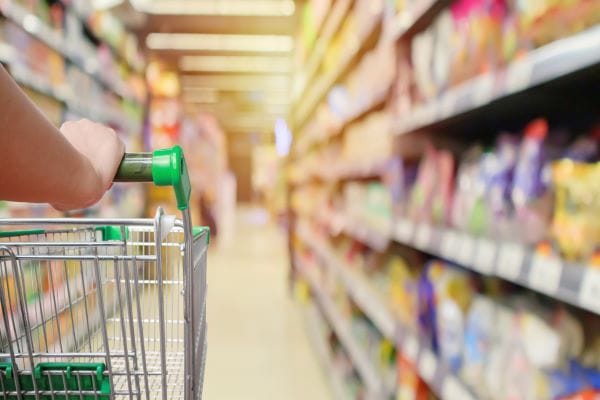When you have to run essential errands, it's important to plan ahead.
Posted
on Monday, June 15, 2020
These days, being able to stroll through the grocery aisles or run errands on a whim can feel like a lifetime ago. But what happens when you need to pick up some essentials? It’s best to plan ahead, and keep coronavirus safety measures top-of-mind.
“We owe it to others who are not so healthy to try to protect them,” says Dr. Kevin Cunningham, MD. “This is about a community trying to take care of itself and others.”

Take these COVID-19 safety measures with you to the grocery store.
Most importantly: Minimize the number of trips to the store. Try consolidating into a weekly trip, or even every other week if you can manage it. Every time you go shopping, you’re increasing your exposure risk, which may be higher in an enclosed space.
When you do need to go into a store, taking the following safety precautions can make a big difference.
- Go alone. Now is not the time to shop socially or bring along family members.
- Have a list, have a plan. The easiest way to shop efficiently is to know what you need.
- Wear a face covering to protect yourself and others around you. Some stores even require this, so it’s best to play it safe. “Your mask will help protect you from contracting a possible virus,” says Dr. Cunningham. “But almost more importantly, your mask protects others when you might cough or sneeze or even just breathe heavily. Your mask will protect others who are potentially at greater risk than you.”
- Don’t touch your face or eyes! That’s how the coronavirus spreads.
- Sanitize the cart or basket handle when you enter, and sanitize your hands, too. But you can skip gloves. It’s easy to use and dispose of gloves incorrectly, which leads to cross-contamination and a false sense of safety.
- Don’t use your cell phone in the store, which can cause you to put your hands directly on or near your face.
- Keep a minimum of six feet between yourself and other people. Some stores have markers on the floor to help you. Otherwise, think of it as two cart lengths.
- Touch only what you need to — it’s not the time to poke around for that perfectly ripe mango.
- Choose a touchless payment option when possible, and give the cashier their space.
- Consider using hand sanitizer (with at least 60% alcohol) after you leave the store but before getting into your car or other transportation.

Virtual Care Available Daily
See a provider without leaving home. Iowa Clinic eVisits offer appointments for primary care and specialties (hours vary).
Learn More
Iowa stores are adjusting during the coronavirus, too.
Grocery-store employees interact with dozens of customers throughout the day, which can increase their risk of exposure. It’s best to give them their space and be patient. In addition to providing protections for workers, Iowa stores have also addressed their physical locations to protect you, too.
- If you are in a high-risk population, see if the store has hours set aside just for you.
- Follow posted signs for one-way aisle traffic and social distancing.
- The number of shoppers that enter the store may be limited during peak times.
- Many stores offer online ordering options, with drive-through pick-up or even doorstep delivery.
- Many have inserted protective screens between you and the cashier and offer contactless payment options, too.
Follow these COVID-19 precautions for items brought into your home.
You may be thinking: Do I need to disinfect everything I buy? And the answer is, well, no. If you feel better after wiping down a box of cereal or jar of jam, go ahead and do it. But don’t stress yourself out trying to disinfect every last item you bought.
Though the coronavirus may live on certain types of surfaces for up to 72 hours, the risk of contracting the virus from a contaminated surface is fairly low if you continue proper handwashing.
You should make the following part of your normal routine, though:
- Wash your hands when you get home.
- Rinse fruits and vegetables with cold water, or use the product wash you can find at the store. Experts don’t recommend using soap, as it could leave residue on your produce and lead to vomiting or diarrhea.
- Psst: Leave the disinfecting wipes or sprays for hard surfaces, as most food packaging isn’t made to handle those. You could actually end up contaminating your food instead.
- If the item doesn’t need to be refrigerated, you can leave it out for an additional 24 hours.
- After you’ve finished unpacking, wash your hands again and wipe down countertops, door handles (including refrigerator/freezer handles), and other hard surfaces.
Look to the experts for more information.
If you have specific questions, please reach out to your provider. You can also find the latest information and coronavirus safety tips from these resources:
All information offered on The Iowa Clinic website is intended to serve as general educational information only. Any content, product or service is not intended to be a substitute for professional medical advice, diagnosis or treatment. If you believe you have a medical issue, always seek the personalized advice of your physician or qualified healthcare provider.
The Iowa Clinic may provide links to outside sources for additional resources or information and is in no way responsible for the information provided by other organizations or sources. © The Iowa Clinic, 2024